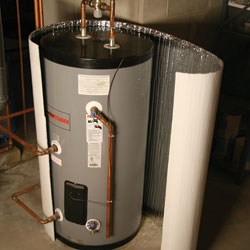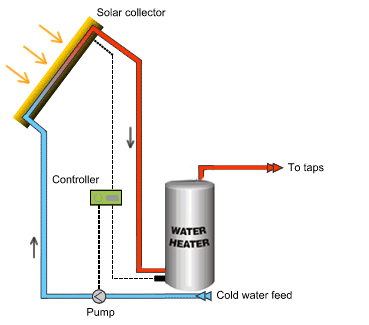Water Conservation
Hot water can be one of the highest energy costs in your home. In a well built, energy efficient home, the cost of hot water can exceed the cost of heating your home! There are several methods to reduce your domestic hot water energy costs:
(1) Hot Water Blanket
A hot water blanket can be purchased in a kit and is generally finished with white vinyl on the outside and insulation on the inside and has enough adhesive to finish the seams. Wrap your water heater with the blanket, especially if it is in an unheated area of your home. The blanket could save you up to 10 percent on water heating costs.

(2) Drain Water Heat Recovery
Often called the “Power-Pipe” consists of copper tubes wrapped around a copper drain pipe and is easily installed in most homes. The unit replaces a section of the existing drain stack and is connected to your fresh water system. It requires no maintenance and should extend the life of your water heater. The DWHR reduces water heating costs by up to 35% and reduces greenhouse gas emissions by up to 1 ton per year.

(3) Solar Domestic Hot Water Heating System
Solar collectors are constructed of aluminum, copper and tempered glass and are easily installed and maintenance free. Solar collectors are installed on the roof and absorb sunlight which converts to heat and this heat is transferred to a non-toxic anti-freeze solution that is pumped through the collector and returns to a Solar Boiler. The Solar Boiler is designed to pre-heat the domestic water that is supplied to your conventional water heater. Even the pump to transport heat from the collectors to the storage tank is powered by the sun. The electric energy required to heat water is significantly less when water is preheated by Solar. On many days, the Solar Boiler will provide ample hot water without the conventional heater turning on. Solar water heating can reduce your domestic water heating costs by as much as 65%.

Other Useful Hot Water Tips:
- Check your faucets for leaks. They waste both water and energy!
- Conserve hot water by installing water-saving showerheads. A new showerhead can save as much as $10 a year in water and energy.
- Reduce your water heater’s temperature to 120 degrees Fahrenheit. That will produce plenty of hot water and still save energy.
- Use cold water to operate your garbage disposal. Cold water use saves energy and is recommended by most disposal companies.
- When washing dishes by hand, use a sink stopper or dishpan so water – hot or cold – doesn’t rush down the drain. Remember, too, that hot water running needlessly not only wastes water, but energy as well.
- Install your hot water tank on a piece of foam. This will insulate it from the cooler concrete floor and will save energy.






Post your comment
Comments
No one has commented on this page yet.
RSS feed for comments on this page | RSS feed for all comments